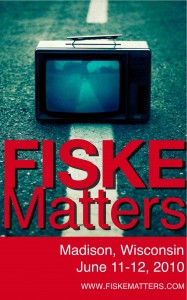Report from the Fiske Matters Conference
 Part 1: “This conference is an intervention”
Part 1: “This conference is an intervention”
With those words, Pam Wilson captured the urgency of the Fiske Matters conference: Over two days in Madison, Wisc., some sixty speakers and attendees reasserted John Fiske’s still powerful, still relevant ideas for a field in danger of losing them. Among the diagnoses: Fiske’s examples are now dated, making it challenging to teach his books; the cheap caricature of Fiske as a naïve populist Pollyanna continues to function as a convenient straw man; the new media landscape invites revision of Fiske’s analyses.
But as several people noted, theory is an ongoing dialogue, and the conference demonstrated the value of staying engaged with Fiske’s ideas. Speaker after speaker showed how Fiske’s productive and provocative theories continue to illuminate our current cultural moment and media landscape. Presenters drew on Media Matters and Power Plays to understand racial politics in the age of Obama and the imperializing populism of the Tea Party movement, or showed how Fiskean approaches to technostruggles, active audiences, and pleasure allow us to analyze power and participation in a range of media forms and practices, including the internet, video games, satellite technology, scrapbooking, poetry, and even—in Fiske’s own keynote address—17th-century furniture. This short report can’t capture the breadth and quality of the contributions, but I’ll put my favorite moments in the comments (and hope others will too), and the Twitter feed provides snapshots of how presenters mined the richness of Fiske’s oeuvre.
A modest subtext of vindication also characterized the weekend: although Fiske has been pilloried and ridiculed, the last ten years have proved him mostly right and often prescient. Henry Jenkins’ keynote, for example, coolly and effortlessly showed Fiske’s theories of active audiences demonstrably borne out in online activism and pop-cultural participatory politics today. Anyone tempted to mock Fiske along the lines of “Listening to Madonna = liberation ha ha” must contend with Jenkins’ wealth of examples in which the skills, literacies, and pleasures of fandom are deployed for political action. At the same time, Jenkins showed how Fiske’s approach could be productively updated, e.g. by replacing “resistance,” appropriate to the industrial information economy, with “participation,” which better describes cultural politics in a read-write age.
Fiske himself, despite claiming to have done no theoretical thinking for ten years, continued to offer new ideas and challenges for the field. An hour into the conference he casually tossed off the insight that norms, which used to be produced at the centers of categories, are now emerging at the margins. He also suggested that the most interesting problem for this generation is the “technologization of the inner self” through social media, a phrase that should immediately enter the literature (and our classrooms). It was a delight to see Fiske still producing such generative ideas.
Part 2: “I am John Fiske”
The conference celebrated not just Fiske’s ideas, but also Fiske the teacher, mentor, and colleague. There was an “Old Home Week” quality to the weekend, a reunion of friends drawn back to Madison by their deep respect for Fiske (an indisputably great teacher) and the intellectual community he fostered. His students carry his instructional style and philosophy into universities around the world, leading Steve Classen (with many nodding in agreement) to declare “I am John Fiske.” That might sound cultish if you weren’t there, but it simply speaks to Fiske’s students’ attempt to imitate his pedagogical example: clearly explaining difficult concepts, remaining gracious to opponents, and fostering a climate of “serious fun.” The conference got emotional at times as John’s former students articulated this dimension of Fiske’s legacy, and as a choked-up Fiske himself put it, “Ideas go out there, they float. It’s the people that matter.”
There will be next steps. The papers will be compiled and published in some form; the website will hopefully become a repository for resources about Fiske; participants will return to their work re-energized as teacher-scholars. The straw-man abuse of Fiske will undoubtedly persist, but Fiske’s ideas will continue to inspire new scholarship and—the ultimate point—help us understand our culture and ourselves. Fiske himself is ever the optimist, thus it seems appropriate to believe that time will continue to prove the central assertion of the conference: Fiske matters.



[…] This post was mentioned on Twitter by Jason Mittell, Antenna. Antenna said: New blog post: Report from the Fiske Matters Conference /2010/06/14/report-from-the-fiske-matters-conference/ […]
Nice summary. Thanks for this!
[…] Kirkpatrick has a better account of the conference as a whole than I would be able to muster over at Antenna, but I do want to make a few observations about the […]
There will be next steps. The papers will be compiled and published in some form; the website will hopefully become a repository for resources about Fiske; participants will return to their work re-energized as teacher-scholars. YES